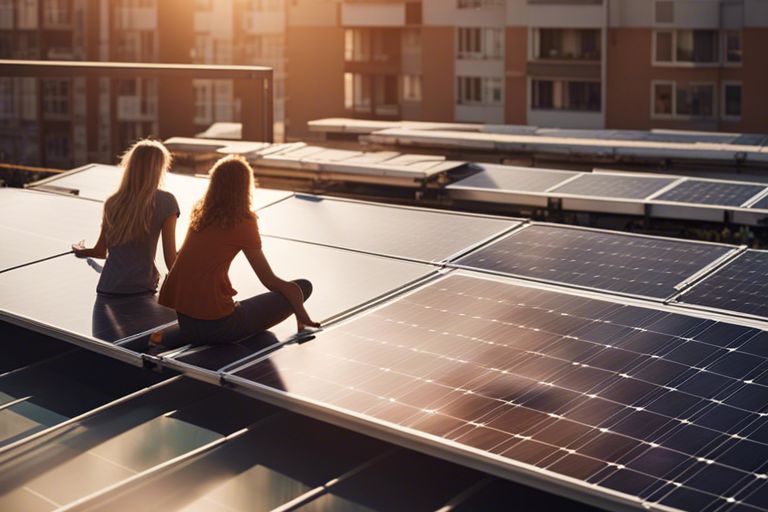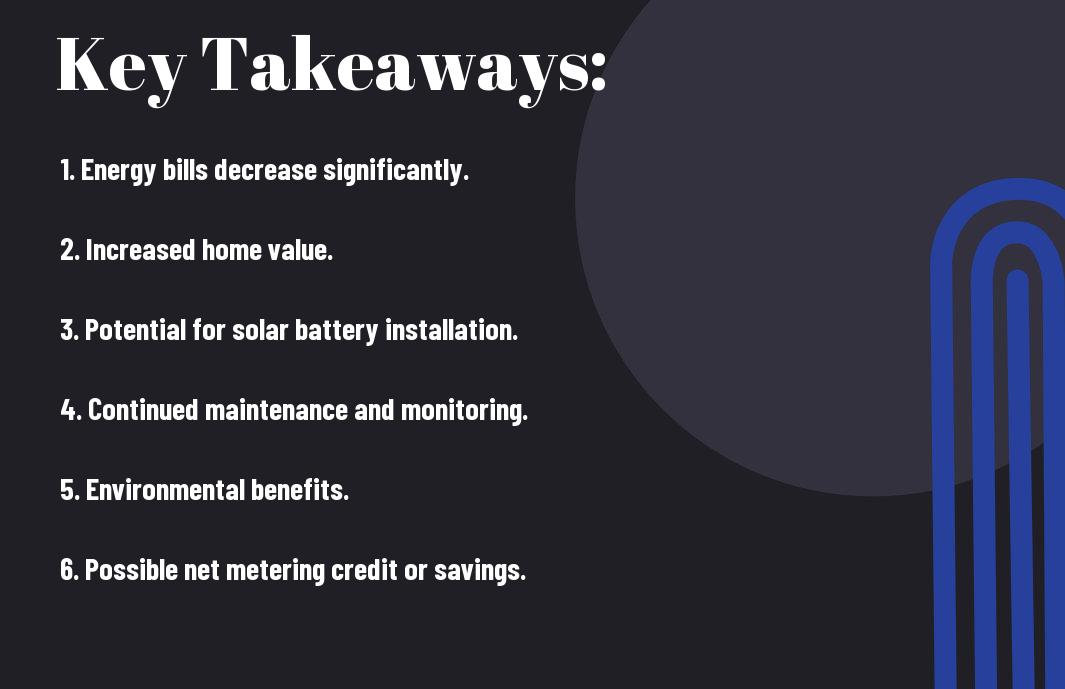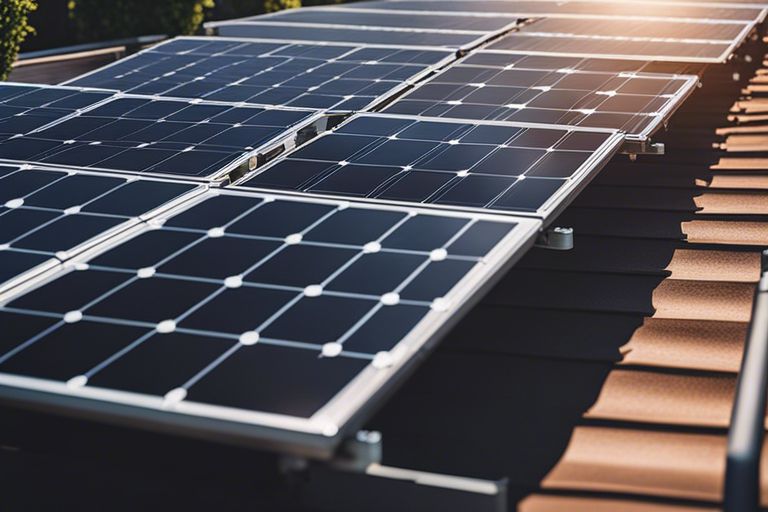Maintenance is key once you’ve paid off your solar panels. After you’ve enjoyed years of savings on your electricity bills and recouped your investment, it’s important to keep your solar panels clean and well-maintained to ensure they continue to operate efficiently. Regular inspections, cleaning, and occasional repairs will help extend the lifespan of your system and maximize your energy production. Additionally, you may want to consider investing in battery storage or upgrading to newer, more efficient panels to further benefit from your solar investment.

Key Takeaways:
- Continued Energy Savings: Once you pay off your solar panels, you will continue to benefit from energy savings as your system generates electricity for years to come.
- Increase in Home Value: Having a paid-off solar panel system can increase the value of your home, making it more attractive to potential buyers.
- Ownership of Solar Panels: After paying off your solar panels, you become the sole owner of the system and all the energy it produces.
- Long-term Investment: Solar panels have a long lifespan, so after paying them off, you are importantly making a long-term investment in renewable energy and reducing your carbon footprint.
- Potential System Upgrades: With ownership of your solar panels, you have the flexibility to upgrade or expand your system in the future to meet your changing energy needs.

Benefits of Paying Off Your Solar Panels
Increased Savings
To start, paying off your solar panels means that you now own your energy production system outright. This ownership allows you to enjoy greater savings over time since you no longer have monthly payments on your solar panels. The initial investment in your solar panels has now paid off, and you can reap the benefits of free or significantly reduced electricity bills for years to come.
Reduced Carbon Footprint
To further incentivize paying off your solar panels, consider the impact on the environment. By generating your electricity through solar power, you significantly reduce your carbon footprint. Solar energy is clean and renewable, emitting no greenhouse gases or pollutants during operation. This means that you are actively contributing to a healthier planet by reducing your reliance on fossil fuels for electricity.
For instance, a typical residential solar panel system can reduce carbon dioxide emissions by an average of 3-4 tons per year. This reduction is equivalent to planting around 100 trees annually or taking more than 20 cars off the road for a year. By paying off your solar panels and continuing to use clean energy, you are making a tangible impact on reducing emissions and combating climate change.
What Happens to Your Electricity Bill
One of the most significant changes you will notice after paying off your solar panels is the impact on your electricity bill. There are several ways in which your electricity bill can be affected, including through net metering and energy credits.
Net Metering and Energy Credits
Bill: With net metering, any excess electricity your solar panels generate is sent back to the grid, and you receive credits for it. These credits can then be used to offset the electricity you consume when your panels are not producing enough power, such as at night. This can result in significantly lower electricity bills or even credits from your utility company.
Reduced or Eliminated Monthly Payments
Monthly: As you pay off your solar panels, you may find that your monthly payments to the solar panel financing company decrease or are eliminated entirely. This can free up additional funds in your budget that you can allocate towards other expenses or savings goals.
A reduced or eliminated monthly solar panel payment can provide you with long-term financial benefits, allowing you to enjoy the savings from your solar panels without any ongoing financial obligation.
Impact on Your Home’s Value
Increased Property Value
Many studies have shown that installing solar panels can significantly increase the value of your home. This is because potential buyers are increasingly looking for homes that are energy-efficient and environmentally friendly. By having solar panels already installed, you are not only saving money on energy bills but also adding a valuable asset to your property.
Potential Tax Benefits
Increased tax benefits are another advantage of paying off your solar panels. Depending on where you live, you may be eligible for tax credits, rebates, or other incentives for having solar panels. These benefits can help offset the initial cost of installation and make solar energy even more cost-effective in the long run.
Another benefit of potential tax incentives is that they can contribute to making your home more competitive on the market if you decide to sell. Buyers are often attracted to homes with solar panels not only for the savings on energy bills but also for the tax benefits they can potentially receive.
Maintenance and Repair Responsibilities
Manufacturer Warranties and Support
Support: Once you’ve paid off your solar panels, it’s important to be aware of the manufacturer warranties and support available to you. Most solar panels come with warranties that cover defects in materials and workmanship for a certain number of years. In case you encounter any issues with your solar panels, you can reach out to the manufacturer for support.
Ongoing Maintenance Requirements
One: While solar panels are relatively low-maintenance, there are still some ongoing maintenance requirements you should keep in mind after paying them off. Regularly cleaning your solar panels to remove dust, dirt, and debris is crucial to ensure optimal performance. You may also need to check for any shading issues from nearby trees or structures that could affect the efficiency of your panels.
Manufacturer: It’s a good idea to familiarize yourself with the specific maintenance guidelines provided by the manufacturer of your solar panels. Following their recommendations can help prolong the lifespan of your system and maximize its energy production. Additionally, if you ever need to repair or replace any components of your solar panels, it’s best to consult with the manufacturer or a professional solar installer to ensure the work is done correctly.
Upgrades and Expansions
Once again, congratulations on paying off your solar panels! As you enjoy the benefits of generating your own clean energy and saving on electricity bills, you might be wondering about what comes next. One exciting aspect of owning a solar panel system is the potential for upgrades and expansions to further enhance your energy efficiency and independence.
Upgrading to Energy Storage Systems
For those looking to take their renewable energy setup to the next level, investing in an energy storage system, such as solar batteries, can be a game-changer. These systems allow you to store excess energy generated by your solar panels during the day for use during the night or when sunlight is limited. By adding energy storage, you can maximize self-consumption of solar power and further reduce your reliance on the grid, increasing your energy independence.
Expanding Your Solar Panel System
With your solar panels fully paid off, you may be considering expanding your system to generate even more clean energy. Whether you initially installed a smaller system or your energy needs have increased over time, adding more solar panels can help you produce additional electricity and potentially achieve greater savings in the long run. Plus, expanding your solar panel array allows you to further reduce your carbon footprint and contribute to a more sustainable future.
Monitoring and Evaluating Performance
Unlike traditional energy sources, one of the great advantages of solar panels is that you can easily monitor and evaluate their performance. This allows you to track energy production and consumption, identify any areas for improvement, and ensure that your system is working at its optimal level.
Tracking Energy Production and Consumption
An important aspect of maintaining your solar panel system is keeping track of how much energy your panels are producing and how much energy you are using. By monitoring these metrics, you can ensure that your system is performing efficiently and that you are maximizing the benefits of your investment.
Identifying Opportunities for Improvement
Evaluating your system’s performance also involves identifying opportunities for improvement. This could include adjusting the angle of your panels, optimizing your energy usage patterns, or even expanding your system to accommodate increased energy needs. By regularly assessing your system, you can make informed decisions to optimize its performance and ultimately save more on your energy bills.
Identifying opportunities for improvement is crucial to getting the most out of your solar panel system. By analyzing your energy production and consumption data, you can pinpoint areas where efficiency can be increased or where adjustments can be made to enhance the overall performance of your system.

Final Words
Summing up, once you have paid off your solar panels, you will continue to benefit from the energy savings and environmental impact of using solar power. However, it’s important to consider what your plans are for the future, especially if you are thinking about moving. If you decide to move, you may need to consider what will happen to your solar power system. To learn more about this topic, you can read the article FAQ: What Happens to My Solar Power System If I Move?.
FAQ
Q: What happens after I pay off my solar panels?
A: Once you have paid off your solar panels, you will own the system outright. This means that you will no longer have any monthly payments towards the panels. Your electricity bills will decrease significantly as you will be generating your own clean energy. You will also be eligible for any rebates or incentives available for solar panel owners.
Q: Will I still receive maintenance and warranty after paying off my solar panels?
A: Yes, even after you have paid off your solar panels, you will still receive maintenance and warranty services. Most solar panel manufacturers offer warranties that typically range from 20 to 25 years. These warranties cover any issues or damages to the panels. It is important to continue routine maintenance to ensure the longevity and efficiency of your solar panels.
Q: Can I sell excess energy back to the grid after paying off my solar panels?
A: Yes, once you have paid off your solar panels, you can potentially sell excess energy back to the grid. This process is known as net metering or feed-in tariff programs. Depending on your location and utility provider, you may be able to earn credits or payments for the surplus energy your solar panels generate. This can further reduce your electricity costs and provide an additional source of income.
